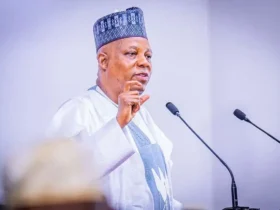The Federal Government has announced the elimination of Junior Secondary School (JSS) and Senior Secondary School (SSS) levels, replacing them with a compulsory 12-year uninterrupted basic education model.
Under this new system, students will complete 12 years of continuous education before pursuing higher education.
With this change, the government aims to phase out the existing 6-3-3-4 education structure and implement a 12-4 model. Additionally, it has sought the approval of the National Council on Education (NCE) to set 16 years as the minimum entry age into tertiary institutions.

The announcement was made by the Minister of Education, Dr. Tunji Alausa, on Thursday in Abuja during the 2025 Extraordinary National Council on Education Meeting. The NCE, recognized as the highest policy-making body in Nigeria’s education sector, convened with the participation of commissioners for education from the 36 states and the Federal Capital Territory (FCT), agencies, parastatals under the Ministry of Education, and development partners.
According to Dr. Alausa, merging secondary education into basic education ensures that students experience uninterrupted learning until age 16. He emphasized that this reform aligns with international best practices and aims to reduce dropout rates by removing financial and systemic barriers hindering students from completing their education.
“Extending basic education to 12 years will ensure a standardized curriculum that is uniformly implemented across the nation,” Alausa stated. “This will also facilitate early exposure to vocational and entrepreneurial skills, preparing students for both higher education and employment.”
READ MORE: https://parallelfactsnews.com/security-economy-improved-under-me-buhari/
The Minister further highlighted that many developed countries have adopted similar models, where 12 years of basic education provide a strong foundation before students specialize at the tertiary level.
He added that the reform is expected to have significant economic and social impacts, as educated youth contribute more effectively to national development.
“When students receive an extended period of compulsory education, they are better equipped to join the workforce with relevant skills. This reform will also reduce child labor and other social vices resulting from premature school dropouts.”
To ensure a successful transition, the government has outlined key implementation strategies, including policy reforms, infrastructure expansion, teacher training and recruitment, funding and partnerships, and curriculum enhancement.#JSS
Follow the Parallel Facts channel on WhatsApp: https://whatsapp.com/channel/0029VaCQSAoHgZWiDjR3Kn2E








Leave a Reply